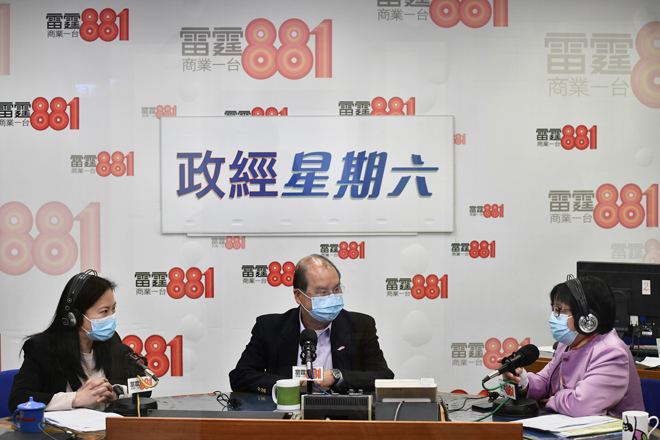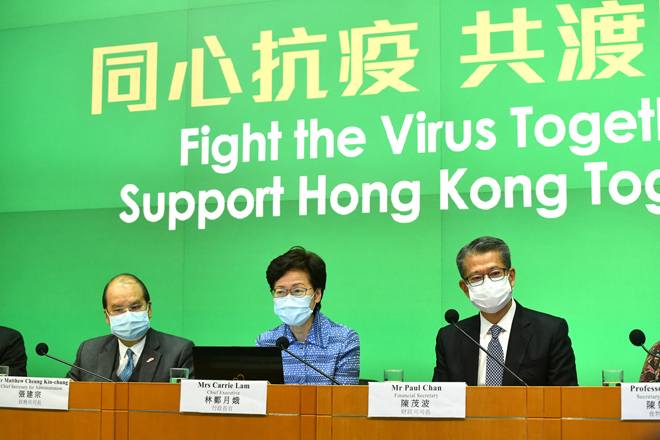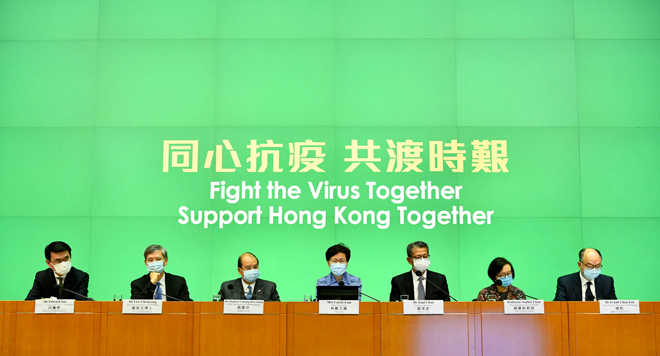Fight the virus together Support Hong Kong together
12 April 2020

|

|

|
Given the catastrophic impact of the novel coronavirus epidemic on Hong Kong’s economy and people’s livelihood, various sectors and industries have found themselves in dire straits, and a wave of pay cuts, layoffs and closures is anticipated.
The epidemic has brought unprecedented challenges to Hong Kong and the Government cannot be indifferent to the city’s being battered by this fierce headwind. Last Wednesday (8 April), the Chief Executive announced a new round of relief measures totalling more than $137.5 billion to help businesses stay afloat, keep people in employment, relieve their financial burden and provide impetus to economic recovery as soon as the epidemic is contained.1 The Government has introduced strong, extensive and targeted relief measures in a decisive, resolute and prompt manner by digging deep into its fiscal reserve accumulated over the years to address the pressing needs of individuals and enterprises, responding proactively to the severe challenges brought by the epidemic.
Among the measures, the $80 billion Employment Support Scheme (ESS) is most remarkable. Under the ESS, the Government will provide a wage subsidy which must be fully spent on wage payments for eligible employers who in return have to retain their employees. The amount of the subsidy will be capped at $9,000 per month, which is 50% of the monthly salary of $18,000 (i.e. the median monthly wage of Hong Kong employees in the second quarter of 2019), and will be provided for a period of six months. It will be disbursed to employers in two payments, with the first not later than June 2020. The ESS is expected to benefit 1.5 million employees.
Wages constitute one of the major expenses of enterprises. The ESS can effectively relieve employers’ burden on salary expenses, thereby avoiding massive closures and job cuts. At this moment of economic hardship, it is incumbent upon the Government to support enterprises and alleviate people’s burdens. However, enterprises should also fulfill their social responsibilities and both employers and employees should work together to ride out the storm.
Apart from the above, the Government will provide support for employers in the catering, construction and transport (mainly concerning taxi and red minibus drivers) sectors, which are not completely covered by the Mandatory Provident Fund (MPF) scheme and involve about 800 000 employees. It will also grant a one-off subsidy of $7,500 to about 215 000 self-employed persons who have made MPF contributions.
To support the unemployed, the Government will temporarily relax the asset limits of the Comprehensive Social Security Assistance Scheme. The asset limit for an able-bodied applicant will be increased by 100% for a period of six months. It is estimated that 40 000 households will benefit.
In terms of job creation, the Government, being the largest employer, will recruit about 10 000 civil servants and 5 000 young interns in 2020-21. It will also invest $6 billion to create 30 000 time-limited jobs in the public and private sectors in the coming two years. To encourage people in various professions to learn new skills and help enterprises apply technology to turn crises into opportunities, the Government will allocate $0.8 billion for implementing job advancement measures.
The Anti-epidemic Fund (AEF) under my supervision has earlier allocated $30 billion to introduce 24 measures. Overall speaking, the implementation has been smooth. Regarding businesses not covered by the AEF as well as sectors affected by the anti-epidemic measures, the Government has received a lot of opinions from various parties. After careful study, the Government is set to provide 16 types of support for specific sectors, totalling $21 billion.
In order to help those small and medium enterprises (SMEs) facing liquidity crunch and cash flow problems, the Government will enhance the SME Financing Guarantee Scheme to increase the maximum facility amount for each enterprise. For example, with the introduction of the 100% Guarantee Scheme on 20 April, the maximum facility amount will be doubled from $2 million to $4 million, thereby greatly enhancing the capital flow flexibility of SMEs. The application period of the Scheme will be extended and the eligibility criteria relaxed for application by listed companies.
Other measures include the provision of rental concessions for eligible businesses or organisations operating in government premises and in respect of eligible short-term tenancies administered by the Lands Department, as well as the extension of the 75% waiver of water and sewage charges payable by non-domestic accounts for another four months from August to November 2020.
To ease the cashflow burdens of individual taxpayers, deadlines for payment of salaries tax, personal assessment tax and profits tax which fall between April and June of this year are automatically extended for three months. Besides, starting from 1 July 2020, the MTR Corporation Limited will provide a 20% fare reduction for six months with half of the discount to be paid by the Government. The estimated additional expenditure is around $800 million, which will benefit more than 5 million passenger trips. In parallel, the Government will temporarily relax the monthly expense threshold of the Public Transport Fare Subsidy Scheme from $400 to $200, which is expected to benefit around 3.8 million commuters.
The new round of relief measures under the AEF amount to $137.5 billion. Together with the first round of measures totalling $30 billion and those announced in the Budget involving $120 billion, the Government has committed a total of $287.5 billion, i.e. 10% of Hong Kong’s Gross Domestic Product, to relieve the hardships of individuals and enterprises. These relief measures introduced over the past few months have been the largest in scale and the boldest policy initiatives of the Government. Despite inducing a huge fiscal deficit, the measures are necessary under the current special circumstances. With Hong Kong’s solid foundation, our public finances will remain stable.
We have been saving up for rainy days. Given the present difficulties, it is the right time to make good use of our reserves. As a responsible government, we will uphold the principle of “people first”. While being fully committed to supporting businesses and providing relief for the people, we will save the city from financial crisis and continue to promote its long-term development. The Government will draw up more targeted and forward-looking strategies to pave way for Hong Kong’s economic recovery, with a view to distinguishing the city from its counterparts.
The Government’s application for a one-off funding of $137.5 billion will be considered by the Finance Committee of the Legislative Council at its special meeting on 17 April. Together with 12 principal officials, I will attend the meeting to field Members’ questions. I urge Members to approve the funding as soon as possible to address the people’s pressing needs in the overall interest of the community.
Given its fundamental strengths and strong resilience, Hong Kong can certainly survive this once-in-a century pandemic. Let us unite to combat the epidemic with perseverance and discipline so that our city may start afresh and move on.
Enclosure: Fight the Virus and Get through the Difficult Times Together Supplementary Information

